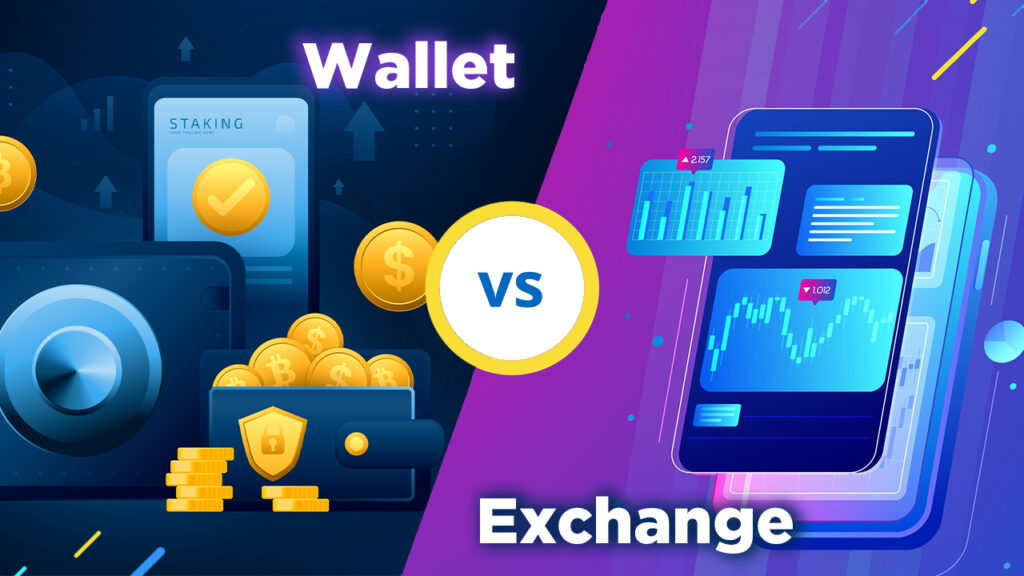Cryptocurrency Exchange vs. Crypto Wallet
In the rapidly evolving world of computerized technology, the use of terms like “cryptocurrency exchange” and “cryptocurrency wallet” by newbies often results in confusion. Despite their primary function being to secure digital currencies, they have distinct uses. This article focuses to demystify these two concepts, clarify their key contrasts, and help you get it which one can be right for your needs.
What is a Cryptocurrency Exchange?
A cryptocurrency exchange is an online platform that encourages the buying, offering, and exchanging of cryptocurrencies. It acts as middle person between buyers and dealers, much like a conventional stock trade. Clients can exchange one cryptocurrency for another (e.g., Bitcoin for Ethereum) or change over cryptocurrencies into fiat monetary standards just like the US Dollar or Euro, and vice versa.
Types of Cryptocurrency Exchange
Centralized Exchanges (CEXs):
Centralized exchanges are worked by companies that act as middle person in exchanges. They are often regarded as the easiest and most straightforward means of exchanging cryptocurrency.
These platforms often provide a wide range of trading pairs, advanced exchange mechanisms and high liquidity.
Some popular exchanges: Binance, Coinbase, Kraken.
Pros: High liquidity, user-friendly interfacing, and frequently coordinates with fiat money choices.
Cons: Helpless to hacking, subject to administrative investigation, and require clients to believe the stage with their reserves.
Decentralized Exchanges (DEXs):
Decentralized Exchanges work without a central specialist, permitting clients to exchange specifically with one another through smart contracts.
These exchanges frequently give more protection, and clients hold control of their private keys.
Some popular exchanges: Uniswap, Sushiswap, Pancakeswap.
Pros: Expanded protection, diminished hacking risks, and client control of reserves.
Cons: Lower liquidity, less user-friendly, and may lack customer support.
What is a Cryptocurrency Wallet? It’s possible to call it merely:- A device that allows users to send, receive and store cryptocurrency together. A wallet is not comparable to an exchange and does not promote commerce, but it could potentially ensure the safety and accessibility of your digital possessions. Cryptocurrency wallets store the private and open keys required to oversee your computerized monetary standards.
Types of Cryptocurrency Wallets
Hot Wallets:
Hot wallets are associated to the web, making them more helpful for visit exchanges but possibly more defenseless to hacking.
These wallets are regularly software-based, available through desktop or portable apps.
Some popular wallets: MetaMask, Exodus, Trust Wallet.
Pros: Simple to utilize, perfect for ordinary exchanges, and frequently free to download.
Cons: Higher chance of security breaches due to steady web association.
Cold Wallets:
Cold wallets are offline capacity gadgets, making them the foremost secure choice for long-term capacity of cryptocurrencies.
These wallets are hardware-based, like USB gadgets, or paper-based, where keys are printed on paper.
Some popular wallets: Ledger Nano S, Trezor, paper wallets.
Pros: Most extreme security, immune to online dangers, perfect for putting away expansive sums of cryptocurrency.
Cons: Less helpful for customary exchanges, potential for physical loss or harm.
Key Contrasts Between Cryptocurrency Exchanges and Wallets
Purpose:
Crypto Exchange: Fundamentally planned for exchanging cryptocurrencies. Clients can purchase, offer, and change over advanced resources.
Crypto Wallet: Focused on the capacity, security, and administration of cryptocurrencies. Clients can send and get stores.
Control Over Resources:
Crypto Exchange: In centralized trades, the platform holds the private keys, meaning clients don’t have full control over their reserves. This will be unsafe in case the trade gets hacked or faces administrative issues.
Crypto Wallet: Users hold their private keys, giving them full control over their reserves. This is often especially genuine for cold wallets.
Security:
Crypto Exchange: Centralized trades are appealing targets for hackers due to the expansive sum of stores put away. Whereas numerous utilize strong security measures, the chance remains.
Crypto Wallet: Wallets, particularly cold wallets, offer higher security as they are less uncovered to online dangers.
Ease of Use:
Crypto Exchange: By and large less demanding for apprentices, with natural interfacing and back for fiat exchanges.
Crypto Wallet: Hot wallets are user-friendly, but cold wallets may require a few specialized information.
Transaction Recurrence:
Crypto Exchange: Perfect for clients who habitually exchange cryptocurrencies.
Crypto Wallet: Way better suited for putting away cryptocurrencies, especially for those holding resources for the long term.
Protection:
Crypto Exchange: Centralized trades regularly require KYC (Know Your Client) confirmation, compromising user privacy.
Crypto Wallet: Decentralized wallets and cold capacity offer more prominent protection as they don’t require individual data.
Which One Do You Wish?
The choice between a cryptocurrency trade and a wallet depends on your objectives and how you proposed to associate with cryptocurrencies.
In the event that you’re effectively exchanging: A cryptocurrency exchange is necessary. You’ll likely require an account on a centralized exchange for its ease of utilize and liquidity.
In the event that you’re holding resources long-term: A cryptocurrency wallet, especially a cold wallet, is perfect. It gives the security required to secure your venture over time.
In any case, many clients find satisfaction in using both. You might utilize an exchange to purchase or offer cryptocurrencies and after that exchange your resources to a wallet for secure capacity. This approach combines the focal points of both platforms. By recognizing their distinct roles, you’ll be able make educated choices, shielding your ventures whereas taking advantage of the opportunities that cryptocurrencies offer.




